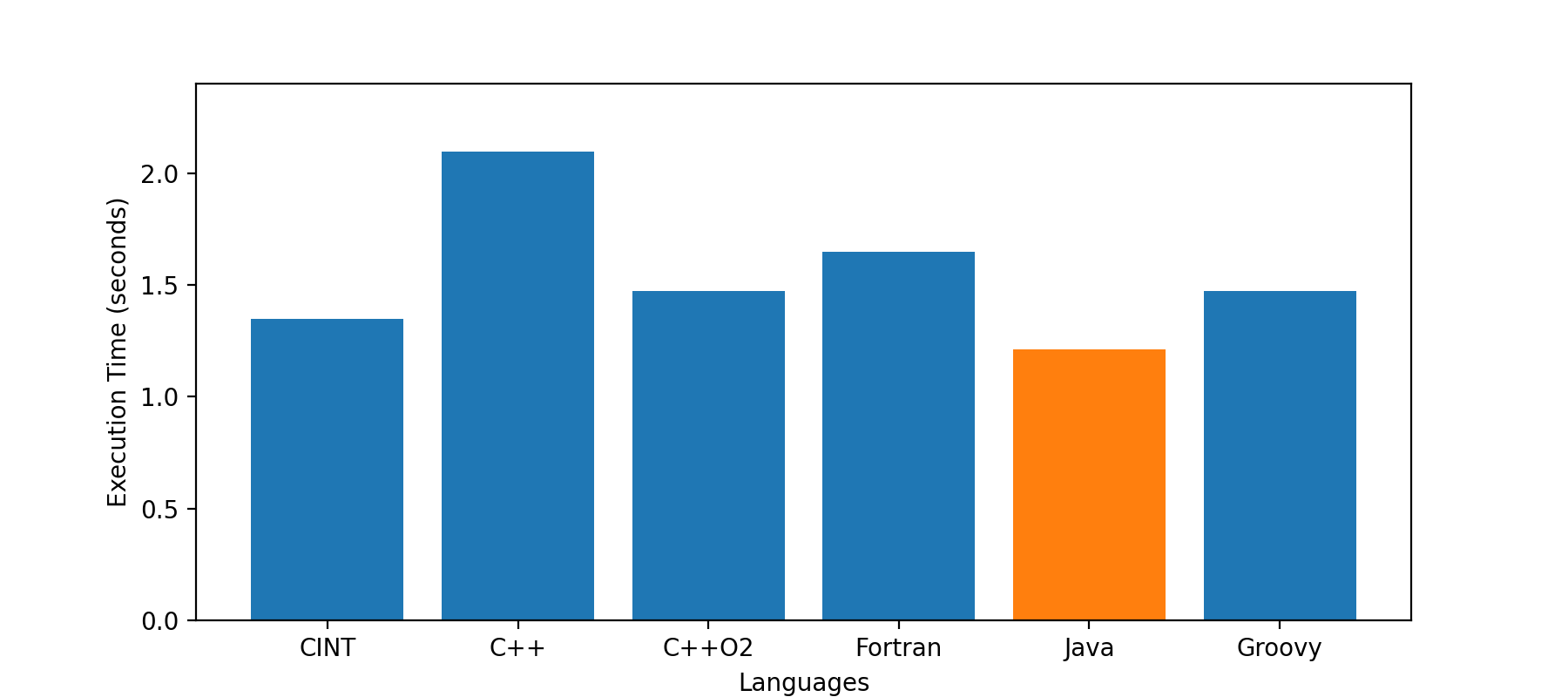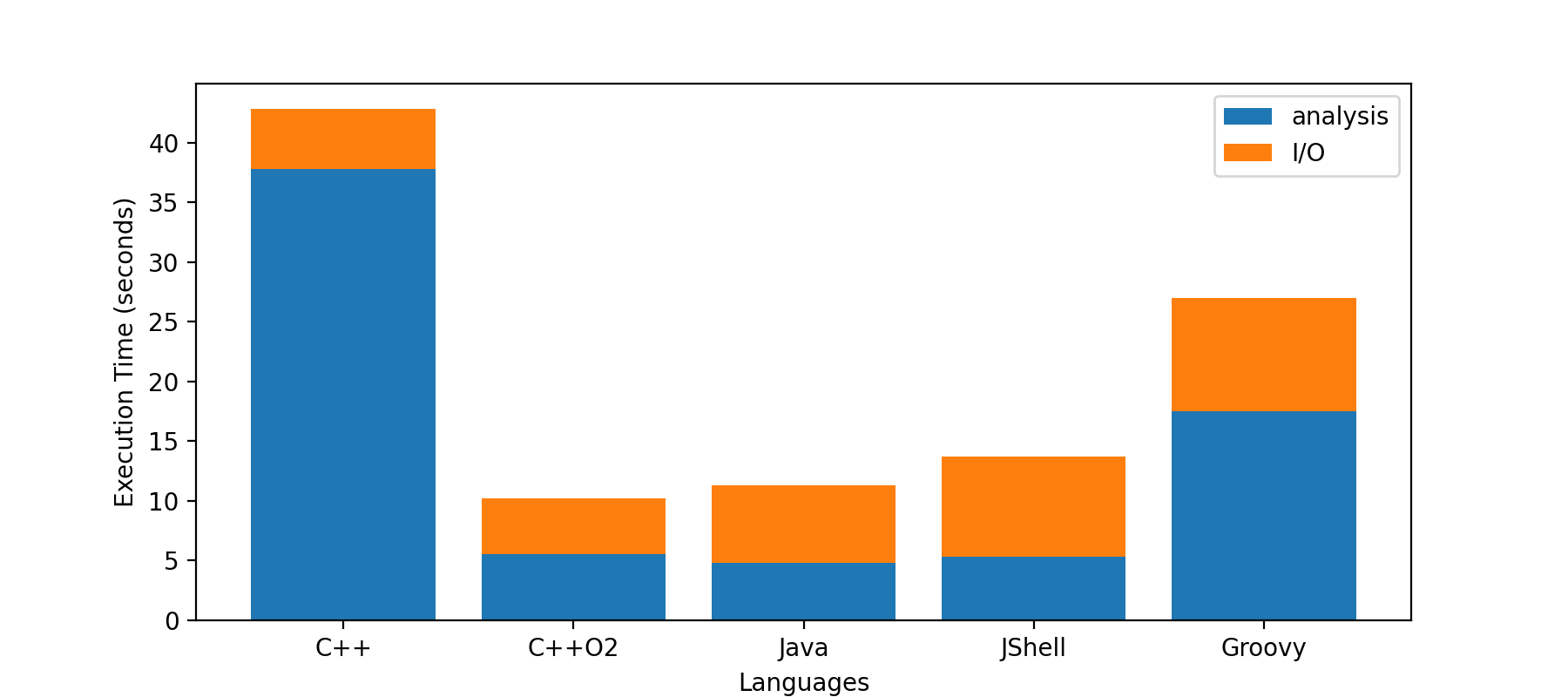Introduction
This repository was set up to test performance of different languages. The test contains mix of things including compiled languages, interpreted languages and scripting laguages. The purpose is to have a clear understanding of advantages and diadvantaged of using one or the other language for data analysis.
There is prevailing opinion (belief, faith mostly held by people who never used Java) in our collaboration that Java is 15 times slower than C++. This might have been true 20 years ago, but Java compilers and interpreters came a long way to optimize and speed up the code. We wanted to test all popular languages in our field (Nuclear Physics) to get some insight if those believes are true or false. Hopefully this benchmarks will be useful for some users when considering one or another language for their daily use.
Disclaimer: I (author of this repository) do not consider myself a C++ expert. Neither do I consider myself expert in any particular language. So before critisizing any of the codes in this repository, please feel free to edit/modify any of the codes and benchmarks. Users are encouraged to form their own opinions, different from the author's.
Benchmarking different languages (simple calculations)
To run examples go the the appropriate folder and type "sh run_all.sh". In order to run all the tests you need to have CERN/ROOT installed (for CINT test), Java JDK, and Groovy. Simple pi value calculations using monte carlo method:
CINT : pi value = 3.141633 time (sec) = 1.3480
C++ : pi value = 3.141698 time (sec) = 2.0960
C++ : pi value = 3.141698 time (sec) = 1.4741
JAVA : pi value = 3.141518 time (sec) = 1.2111
GROOVY : pi value = 3.141373 time (sec) = 1.4722
FORTRAN: pi value = 3.141438 time (sec) = 1.6500
('PYTHON : pi value = ', 3.14170084, ' time (sec) = ', 47.20268702507019)
The unexpected result of this benchmark was how slow is python for simple calculations. The authors are aware that this is not real benchmark of pythons ability to crunch numbers but they did not know how to use numpy for this simple example. The python benchmark is removed from the reults graph since it makes all other results to look very small.
As can be seen from the plot, Java performs better for this task than C++. The C++ codes were run once to get the time (in the future we will include in the code, running several times and taking the average), as for Java, the code runs the calculation 3 times in the silent mode as a warmup for JIT to kick in, then a run is made to measure excution time.
However, this is just a test of how simple computations compare in each language, the next stage is to test ability of object orianted languages to deal with heavy object creation and destruction and testing the standard libraries of each language.
Fortran benchmark is the most unexpected one, Fortran is claimed to be the fastest language for math and yet, Java outperforms in this test. To try Fortran benchmark compile and run the code "pimc/benchmark.F". I did not know how to measure time inside the fortran code, so the time was measured with unix "time" command.
> gfortran -O2 benchmark.F
> time ./a.outOutput:
throw = 100000000 success = 78535970
FORTRAN : pi = 3.14143872 time = 0.00000000
1.650u 0.002s 0:01.65 100.0% 0+0k 0+0io 0pf+0wBenchmarking Analysis
This tests are designed to be similar to the analysis we do in nuclear physics. Experimental data was used where two objects are present in the file, one with particles detected in each event and the second object is detector response to the particle (i.e. electromagnetic calorimeter). First we create a a map that stores indecies of particles that each calorimeter hit refers to:
std::map<int, std::vector<int>> reference;and then we compute deposited energy in calorimeter for each neutrally charged particle and compute sampling fraction (i.e. momentum divided by energy) and count how many particles we have with sf > 1.0. The results of the analysis in different languages shown below.
In the benchmark the I/O and analysis times are measured separately, in case of C++ code (without -O2 optimization) the I/O library is compiled with "O2" optimization, only the analysis code is not optimized. As can be seen from the results C++, Java and JShell perform the same (analysis part), Java is slightly (~10%) faster than C++ optimized code. Grovvy is slower than Java as far as computations go, the I/O is not much slower since compiled Java code is used to do the I/O. It is worth mentioning that I/O libraries that are used in Java are old implementation of LZ4 compression library, that have been updated in the past years with significant speed improvements. The I/O library is in process of migrating to new versions which will speed up the I/O and match the speed provided by C++ (after all, the Java I/O is using the "c" code through JNI, and it provides the same speed).
Conclusion
We tested performance of several languages to assess their usability as data analysis medium. From the benchmarks it is apparent that modern Java is not significantly slower than C++ (well defenetly not 15 times as my collegues claim)., and it comes with several options for rapid code testing and scripting. Groovy is somewhat slower, but very useful tool to test out workflows. JShell (comes with JDK) provides similar speed to Java compiled code, and can be used to test code and compine functionality to make a workflow.

